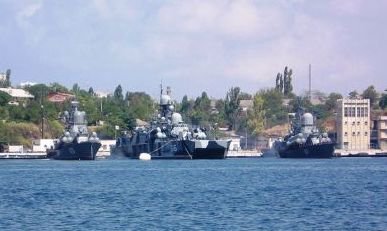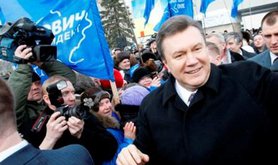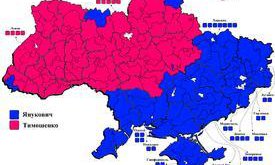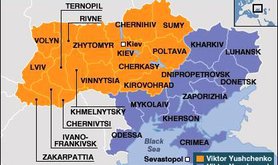On 27 January this year, a convoy of several cars crossed the border of Ukraine from the unrecognized Pridnestrovian Moldovan republic. For the people in the cars the journey had only one purpose: they were going to meet someone they all knew. They arrived at a previously arranged spot and the Ukrainian visitors behaved rather strangely – three cars drove off in different directions and one remained where it was. After the usual handshake and a few meaningless phrases the Ukrainian, Ruslan Pilipenko – the person the visitors from the Pridnestrovian republic had come to see – gave his acquaintances a USB storage device, and they gave him an envelope containing $2,000. Several minutes later all five of them were being handcuffed by soldiers from the special division of the Ukrainian Security Service Alfa, whose task it is to oppose and disarm terrorists. This was how Russian spies were detained in Ukraine.
Valentin Nalivaichenko, Security Service chairman, later revealed that three of the five were employees of the Russian Federal Security Service (FSB), and one was a soldier from the Operational Group of Russian Forces in Moldova. Ruslan himself turned out to be not just a good lad, but an officer of the Ukrainian Defence Ministry Intelligence Department working undercover. “One of the proofs that the operation was carried out by FSB officers is the fact that the USB storage device contained the memory of a mobile phone confiscated from senior lieutenant Andrei Alexeevich Khort, and photocopies of secret regulations governing Russian FSB agency activities,” said Nalivaichenko. Striking though this story is, it is far from the most significant aspect of the question as to how Russia influences Ukraine.
Pure calculation
Relations between Ukraine and Russia run much deeper than any spy story. In the Soviet period Ukraine was considered the “sister” and Russia the “brother” – usually the elder brother - in the USSR family of nations. For the majority of the cultural intelligentsia, success in the capital of Ukraine was only important from the standpoint of how strongly it affected subsequent success in the capital of Russia (USSR). Since Ukraine became independent, relations between the two nations have acquired an element of consumerism: we began to evaluate our liking for each other in rubles, then in dollars, and then in euros. So the economy is one of the main methods by which Russia influences Ukraine.
Ukraine is a country rich in two things – fertile black earth and steel plants. In the 19th century Nikolai Gogol, an outstanding writer of Ukrainian origin, wrote that the earth in Ukraine was fertile: “Put a stick in the ground and it will grow”. The steel plants make it possible for businessmen on the Forbes rich list to grow their capital: Lakshmi Mittal, who owns ArcelorMittal Krivoy Rog in Ukraine, is in second place on this list; Rinat Akhmetov, who is 397th on the list, has the second largest capital in Ukraine. So far, Russia has not tried to interfere in issues concerning mining and metals production. There are two exceptions: Russian companies Rusal (which controls the Nikolaev Alumina Refinery and the Zaporozhye Aluminium Complex) and Evraz (the Petrovsky iron and steel works in Dnepropetrovsk). At the same time Russian businessmen control virtually the whole oil and gas business in the country, and almost half the chemical industry. Gas is delivered to Ukraine by Gazprom, and oil is processed at Lukoil refineries in Odessa and Ivano-Frankovsk, TNK-BP enterprises in Lisichansk and Lugansk.
A cultural past…
But I would still not call the economy the main link between our two nations. Language, culture, a common history and relatives – this is what connects Ukraine and Russia. These invisible ties are much closer and stronger than economic dependence. If one looks at the history, the east of Ukraine and Crimea were settled mainly in the 1930s by people from Russia. At that time Poland and Hungary formed the western part of present-day Ukraine, and Romania the southern. Unlike Poland or Romania, however, Russia, and subsequently the USSR, became empires, which would never give up territories they had even once taken under their control.
No language is as widespread in Ukraine as Russian, even though the authorities try to control Russian television broadcasts inside Ukraine – in Kiev only four Russian channels are accessible on cable TV. In this Ukraine is acting quite correctly in its own interests. The impressions gained of Ukraine from watching Russian television channels are very similar to those gained of the USSR during the cold war from watching American news. But instead of bears holding balalaikas roaming an eternally snowy Red Square, you will see a Ukrainian nationalist praying to a portrait of Stepan Bandera, eating borshch and salo [bacon fat ed] and proclaiming his hatred of the Russians. Media influence is another method the Russians use to ensure we don’t stray too far. Ukraine lost the “gas war” to Russia in 2009 as a result of a colossal media campaign. All the channels portrayed Ukraine as an unreliable partner, while Russia played the innocent victim of Ukrainian lawlessness and, of course, high-handed nationalists.

Corvettes of the Black Sea Fleet
Secret service activities, the economy, culture, language… This list of the points of contact with Russia could be continued for a long time. Take, for instance, the military sphere and, above all, the issue of the Russian Black Sea Fleet (BSF) being stationed in Ukraine. It’s not even a question of influence here – the Russians feel at home in Sevastopol and the city itself is a “city of Russian glory”. Last summer Ukrainian authorities recorded several cases of unsanctioned transportation of cruise missiles by the BSF. On 8 July officers of the State Vehicle Inspection Service detained a column of BSF trucks. It included three rocket transporters on KrAZ vehicles, accompanied by an armed guard and a fire safety vehicle. The vehicles were transporting a bulky cargo covered by a tarpaulin through the region. It was later discovered that this cargo consisted of “Malakhit” cruise missiles, which were being taken by road to the BSF missile base, located in the village of Sakharnaya Golovka. The route was over 30 km, and passed through Sevastopol.
…And an uncertain future
All the above are, of course, isolated facts, but they go to make up the politics of intergovernmental relations. As the saying goes, “life is like a chain, and the little things in it are the links – you can’t ignore the importance of the links.” It is no secret that relations between Ukraine and Russia deteriorated significantly during Viktor Yushchenko’s presidency. Russia made a point of refusing to send its ambassador Mikhail Zurabov to Kiev until the results of the first round of the 2010 presidential elections had been declared and it was clear that Viktor Yushchenko had not received enough votes to qualify for the second round.
To be quite honest, I personally actually quite like this type of Ukrainian-Russian relations. Yushchenko tried to instil a general respect for Ukrainian culture and language. Perhaps he did it the wrong way. As I mentioned above, half the population of Kiev speaks Russian. But the other half speaks Ukrainian! Which is a good start. At his last press conference as head of state, Yushchenko declared that Russia was not yet able to accept an independent president of an independent Ukraine. “Russia still needs time for a generation of politicians to grow up who will be guided by the fairly simple truths of international relations. More time is needed,” he said. “While there is a Ukrainian president, there will be a similar attitude (a negative one – V.K), whoever it is. Our obligation is to have good relations between Ukraine and Russia. But not to neglect national priorities or the national choice”.
It would seem that the new Ukrainian president, Viktor Yanukovych, will not adhere to this policy. Even before he took office, he promised Russia that he would make Russian the second official language, review the conditions and terms for the stationing of the Black Sea Fleet in Crimea, and create a gas transport consortium, which means losing the opportunity to influence gas pricing policy… Time will show to what extent Viktor Yanukovych becomes a Ukrainian president. What is important is that Ukrainians should in future be able to identify themselves as representatives of a sovereign nation. Presidents are like the seasons, after all – they come and they go.
Valery Kalnysh is deputy editor-in-chief of the “Kommersant Ukraina” newspaper published in Kiev.
Read more
Get our weekly email





Comments
We encourage anyone to comment, please consult the oD commenting guidelines if you have any questions.